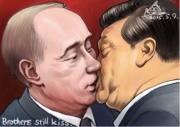|
Just don't call it surplus value, people are generally able to internalize the basic idea that the product of their labor is being appropriated by a parasitic third party, but if you start framing things using the same language as regular capitalist economics they'll default to a bunch of existing assumptions associated with that kind of verbiage and you've already lost
|
|
|
|

|
| # ? May 10, 2024 19:02 |
|
Bourgeois economics completely ignore surplus value from labor though.
|
|
|
|
Reading capital, marx says: - a commodity has both a use and exchange value - money is a commodity how doth this explain fiat money. i can see it working for gold, but the US dollar has no real use value no?
|
|
|
|
mila kunis posted:Reading capital, marx says: you can wipe your rear end with the bills and use the coins in magic tricks
|
|
|
|
mila kunis posted:Reading capital, marx says: I don’t have the text in front of me but I don’t think money isn’t strictly a commodity. It is a universal expression of exchange value. Gold’s use value and value as an exchange are divorced, just Iike in fiat currency. There is no ‘real’ value which is a key reason for commodity fetishism - the exchange value becomes fetishized above the usefulness of the thing and the labor it takes to make the thing is hidden. I could be wrong because my memory sucks but that is how I understand it.
|
|
|
|
mila kunis posted:Reading capital, marx says: the use value of modern fiat money is just 0. it works the same way otherwise. its hoarded by psychopaths just like any other commodity. its merely the primary commodity of exchange. also i thought gorbachev was dead. someone ice that loving traitor
|
|
|
|
i've struggled to understand--and still don't tbh--the marxian economics analysis of fiat currency. poster uncop tried to explain to me how marxism fits/doesn't fit together with MMT but a lot (most?) of it was over my head: https://forums.somethingawful.com/showthread.php?threadid=3826121&pagenumber=1471&perpage=40#post496597538 if you click the ? on that post, to pull up his other posts in that thread, i think he said some other stuff about currency worth checking out e.g. https://forums.somethingawful.com/showthread.php?threadid=3826121&pagenumber=1394&perpage=40#post495578526 seems relevant but, again, i don't really have a good grasp on the issue Finicums Wake fucked around with this message at 10:11 on Aug 21, 2019 |
|
|
|
mila kunis posted:Reading capital, marx says: the real use value is that US dollars are only way to pay taxes owed to the US Government
|
|
|
|
also who cares how marxism fits into modern monetary theory. it's like asking how landlords fit into it
|
|
|
|
I was under the impression that a commodity is rather defined as "something that is produced for its exchange-value, rather than its use-value" and in that sense, money is not a commodity, and fiat money is simply a means by which to ensure that the use of money as a medium for exchange can never run into physical limits or the market distortions caused thereby
|
|
|
|
gradenko_2000 posted:I was under the impression that a commodity is rather defined as "something that is produced for its exchange-value, rather than its use-value" That's correct. When Marx was writing about money everyone was on a metal standard based on gold or silver, and fiat currencies were only issued during emergencies like when the US government issued green backs during the civil war. So in Marx's time all money was based on an underlying commodity's exchange value. But money itself isn't a commodity. The exchange value of money can only ever equal itself. It only has value relative to the basket of goods it can purchase. So money can't be a commodity because it only has use value as a medium of exchange, but commodities have both use and exchange values. So you can exchange commodities for other commodities, but you'd never exchange money for money. Not unless you were exchanging for foreign currencies for international trade. All commodities have an intended use value which is meant for consumption, but money's only intended use value is exchange. You'd never want to "consume" money, you'd only ever exchange it. Like you say, the intent of fiat currency is to eliminate the threat of people attempting to "consume" their money by exchanging it for the underlying commodity it represents.
|
|
|
|
Token money can be argued to have a kind of use-value in terms of discharging taxes/fees, as MMT folks note, but bear in mind that this doesn't make it "money" in the sense Marx is discussing in capital Vol I, and nor does it need to be! something I posted in Peel's Let's Read Capital thread from a couple years ago: quote:In the case of fiat tokens it's not strictly accurate to think of its costs of production in terms of "value," since it's not Essentially fiat money relates to commodity money in the way that the superstructure relates to the base. For further reading, here's a good essay.
|
|
|
|
i heard recently that one of the reasons the usa went off the gold standard was because the ussr controlled a good portion of the gold production at the time and could use that to possibly flood or starve the market
|
|
|
|
Aeolius posted:Essentially fiat money relates to commodity money in the way that the superstructure relates to the base. I dunno about that. If you take out the base then the superstructure collapses, but if you completely removed gold from world markets it wouldn't destroy the value of fiat currencies, because their value is relative to all commodities and not just gold. The relation of fiat currency to commodity currency is one of historical development. You needed a gold standard to form the basis of initial value for fiat currency, but after decades of development the value of fiat is completely removed of its direct ties to gold. Gold still functions as a speculative store of value when people panic about currency values, but that doesn't make the gold money itself. It's similar to the problem with crypto coins being purely speculative commodities, because they only have value when they're priced in terms of fiat currencies. You could exchange crypto for goods and services, but you wouldn't want to because their speculative value is so volatile. For the same reason you wouldn't want to be exchanging gold in the same way. The value of gold could jump up according to speculation after you've made the exchange, which means you've lost out on potential value. Fiat money on the other hand only ever loses value through inflation, so you gain more by exchanging it now than you would by sitting on it.
|
|
|
|
Serf posted:i heard recently that one of the reasons the usa went off the gold standard was because the ussr controlled a good portion of the gold production at the time and could use that to possibly flood or starve the market in 1914, the gold standard was more-or-less suspended the world over because it was the only way that all the spending demanded by the wars could be financially conjured up ___ in 1925, the gold standard was re-implemented by the UK, in the hopes of letting it provide some kind of financial stability again, but it didn't work out that way. Indeed, the deflationary issues created by staying on the gold standard was arguably the primary method with which the Great Depression propagated itself across the globe ___ by 1931, economic blocs had formed: the UK, Denmark, Sweden, Norway, and Finland left the gold standard again, just six years after its re-implementation. From 1929 to 1938, these countries had an average growth in real GDP of 2.74% France, Belgium, the Netherlands, Switzerland, and Italy stayed on the gold standard. For the same time period, these countries had an average growth in real GDP of 0.42% Germany was officially still on the gold standard, but its policy makers largely managed to isolate it from the gold standard's deflationary effects. Its growth over this same time period was 2.5% the USA's growth over this same time period was -0.6%, as in negative ___ now obviously these economic blocs don't correspond to the actual belligerents in the war, but it's pretty clear to see that there was a significant disjunction in economic recovery and growth, and the goldStandard-notGoldStandard dichotomy, and its subsequent effects, was a fairly significant contributor to the failure to establish some kind of post-WWI global international order, and that disjunction essentially widened until it triggered WWII (which is perhaps an oversimplification, but one way to look at WWII's causes in economic terms) so we get to 1945, and Europe's been reduced to ashes, and so has large swathes of Asia, and there is now a chance to create a new global international order, with the USA at its head, because the US is really the only one to have come out of the conflict largely unscathed and has the financial and industrial power to head such an order. As well as, of course, the military power to ram-through the order to anyone who wasn't willing to play ball. and this was the Bretton-Woods System: a new international monetary system based on fixed exchange rates, with the US dollar as its anchor. but the only way that latter clause would work, and therefore for the rest of it to work, would be if the US dollar could be issued essentially at-will. And so, the US had to go off the gold standard. ___ this is just one view on the topic - my source is "The European Economy Between The Wars" by Feinstein, Temin, and Toniolo
|
|
|
|
so... no, then?
|
|
|
|
Pener Kropoopkin posted:I dunno about that. If you take out the base then the superstructure collapses, but if you completely removed gold from world markets it wouldn't destroy the value of fiat currencies, because their value is relative to all commodities and not just gold. I would propose that this is exactly why you can't completely remove gold from world markets, though, and why such has never happened. Its role has shifted through the historical development you mention, but it's still very much a primary factor, even without its presence in day-to-day circulation — hence the continued importance of gold reserves for central banks. And there are reasons both physical and social (a number of which are discussed in vol 1) that ultimately drive us to a single referent, as opposed to an abstraction like "all commodities." A framing I've found helpful: Taking the dollar off the gold standard doesn't remove gold from consideration, but rather removes the legally enforced peg and floats the two against one another. It's a superstructural change, in other words, that doesn't actually change the underlying economic laws. It can obscure them, though — especially when you've got enormous masses of surplus value cushioning things. (that said, for a recent example of gold playing a pretty striking role in contemporary geopolitics, see the leaked 2011 emails discussing the US and French views on Qaddafi building up gold reserves for a pan-African dinar. see also what happened to those gold reserves after NATO killed the Libyan state) Aeolius fucked around with this message at 16:57 on Aug 21, 2019 |
|
|
|
Aeolius posted:A framing I've found helpful: Taking the dollar off the gold standard doesn't remove gold from consideration, but rather removes the legally enforced peg and floats the two against one another. It's a superstructural change, in other words, that doesn't actually change the underlying economic laws. But the underlying economic law is the law of commodity exchange, not of "commodity money." If you removed gold from world markets there would be a panic, but the end result is some other commodity with similar qualities substituting gold as a reserve of value. It still wouldn't be money though. My issue is just that the way you composed that post implies commodity money is the base of a fiat money superstructure, when the base is commodity production & exchange.
|
|
|
|
Pener Kropoopkin posted:But the underlying economic law is the law of commodity exchange, not of "commodity money." If you removed gold from world markets there would be a panic, but the end result is some other commodity with similar qualities substituting gold as a reserve of value. It still wouldn't be money though. My issue is just that the way you composed that post implies commodity money is the base of a fiat money superstructure, when the base is commodity production & exchange. Commodity exchange is what gives rise to money, which takes the form of one commodity against which the others are exchanged, or at the very least on the basis of its measure — that is, it serves as the form of value. Gold could be supplanted from this position if some other commodity shouldered that burden, and indeed this would almost certainly be a panic situation, but that doesn't confute or contradict the above. I feel your concern about centering commodity production and exchange, but any reference to a money commodity fully presupposes and implies this condition. So I agree that we're mostly bouncing back and forth on compositional issues. I guess the thing I'm not following is what you mean by "it still wouldn't be money"; when is money not money? (ˇɹɐɾɐ s,ʇᴉ uǝɥʍ) Aeolius fucked around with this message at 17:33 on Aug 21, 2019 |
|
|
|
Serf posted:so... no, then? at least not according to this source I have available. Bretton Woods seemed to be a good enough reason all by itself, and if anything, the Soviets were even invited to join the Marshall Plan. They refused, ostensibly because it would have allowed the West far too much control over what would essentially be the USSR's domestic economy because of how the exchange rates would have worked, and that seemed to have been the correct call.
|
|
|
|
https://twitter.com/athenogenes/status/1164183135871012864 First as tragedy later as farce
|
|
|
|
Aeolius posted:Commodity exchange is what gives rise to money, which takes the form of one commodity against which the others are exchanged, or at the very least on the basis of its measure — that is, it serves as the form of value. Gold could be supplanted from this position if some other commodity shouldered that burden, and indeed this would almost certainly be a panic situation, but that doesn't confute or contradict the above. I feel your concern about centering commodity production and exchange, but any reference to a money commodity fully presupposes and implies this condition. commodities can’t be money because money is defined by its exclusive use for exchange. gold still has a utility independent of its exchange value. so you can have “commodity money” but not a “money commodity” in present day economics. past economies where certain commodities like grains and metals could represent the role of money no longer apply. gold still can’t fulfill the money role because you wouldn’t want to exchange it for a basket of goods anymore, it can only act as a reserve for value. money is no longer money when it can’t be used as a medium of exchange. like, a Roman coin wouldn’t be used as money anymore because it has more exchange value in terms of the fiat money you could exchange it for. the coin itself is transformed into a commodity due to historical developments.
|
|
|
|
Pener Kropoopkin posted:commodities can’t be money because money is defined by its exclusive use for exchange. gold still has a utility independent of its exchange value. so you can have “commodity money” but not a “money commodity” in present day economics. What change since the 19th century do you believe made the concept of a money-commodity cease to apply to the analysis of capitalist production? (Other than ending gold convertibility, which, as I've mentioned, remains perfectly explicable in "orthodox" Marxist terms.) You wouldn't circulate gold coins down at the supermarket, no (and nor, strictly speaking, did you do so under the gold standard), but claiming that that's enough to discount it from the category of money seems naive to me; at the very least, it calls for more legwork than mere assertion. Just off the top of my head, by the exact same measure, you could claim that money has ceased to exist altogether, since there's nothing that simultaneously fulfills all of the criteria of measure of value, standard of price, means of circulation, store of value, and means of payment. (Unless, I suppose, you're considering means of circulation to possess a keystone quality the other characteristics lack, but here you'd have already departed from Marxian econ, since if he describes any one of them as "chief," it's measure of value.) More adequate to the state of the world monetary system, I think, is to look at all these different things that we think of in one way or another as "money" and see how they fit together, where they came from, where they go, etc. Hence my base/superstructure distinction — some entities in that sphere are direct results of the relations of production, and themselves embody value, and others are legal entities, claims on other value-embodying monies/assets (and claims on claims, and so on), and other related contrivances. At the end of the day, the existence of the latter cannot persist without the former unless we've done away with capitalist production outright. Also the Roman coin in question probably wouldn't be a commodity per se; more of a collectible, like a Rembrandt painting or the like. Remember, the ongoing production of a given commodity is a part of what subjects it to the law of value. Aeolius fucked around with this message at 04:26 on Aug 22, 2019 |
|
|
|
I'm slowly reading through this thread and am still wading throw dozens of pages of 'degrowth' arguing, so this post will have nothing to do with the polec stuff going on now. There's a fundamental problem with advocating anprim/degrowth strategies as a solution to 'climate change', especially if we're going to call ourselves materialists. The problem has to do with how nature is conceived of in the first place from within the bourgeois order, and worse, that pretty much all environmental movements up till now have been working off of this extremely idealist, quasi-mystical conception. I'll try to be brief. The planetary ecosystem has no balance or equilibrium. Nature has no 'natural' state. There's nothing to go back to. Even if capitalism were over tomorrow and we all kumbaya'd into an anprim 'utopia' together, the climate would still exponentially feedback loop itself into a completely unlivable state within a few generations. poo poo's already baked in and the writing's on the wall. Even naming the problem as 'climate change' reifies some optimum equilibrium we can get to if we all work together. 'Anthropocene' is better, although this is another bourgeois concept that ignores the historically specific relations of production that define capitalism and it tends to lead to anti-humanist nihilism. Afaic the only serious materialist angle on this is the 'Capitalocene'. The problem isn't moral rot or overconsumption or overproduction or sustainability, let alone the despicable Malthusian obfuscation of overpopulation, the problem is that through the mediation of capital, the transhistorical metabolism between humans and nature - the labor process - is now the determining factor in the planetary ecology. Capitalism has essentially amounted to the beginning of a massive terraforming project with an implicit end-goal - a ball of dirt for cockroaches and tardigrades. The practical upshot is that any attempt to dismantle the productive apparatus we/capital has built is just an extremely stupid way to commit species-suicide. We can't go back. We are now responsible for this planet and the capitalist productive apparatus is the only tool we have to maintain our role in the planetary metabolism. Losing this lever equals extinction, and leaving it to take care of itself in it's capitalist form amounts to the same. The task of a 21st century ecocommunism is to take control of the terraforming project our idiot liberal ancestors have saddled us with and transformatively redirect it towards minimally habitable ends, and this project goes on forever because there has never been and never will be a natural state of ecological equilibrium. Some of the theoretical implications of this are that concepts like sustainability, preservation, Luddhism, Malthusianism, degrowth, all your anti-humanist deep ecology hippie junk, sure it's all inherently democidal, but more importantly its just pissing in the wind. It won't do anything except maybe delay the end for a few people. Billions of people are going to die regardless of who ends up winning the struggle for the future. Millions of extant species are going to go extinct, and the eco-war-communism we have to build isn't going to be fun or luxurious. There's no way around this, and bitching and moaning and throwing moralistic blame around about the casualty counts of x and y approach just belies an inability to stare utterly indifferent historical necessity in the face. We will do this, or there will be no 'we' anymore. Degrowth and antiproductivism are not the answer - the rational, ultra-hi-tech, scientifically planned production of a new planetary ecology is the only way forward. emTme3 fucked around with this message at 09:05 on Aug 22, 2019 |
|
|
|
Aeolius posted:Also the Roman coin in question probably wouldn't be a commodity per se; more of a collectible, like a Rembrandt painting or the like. Remember, the ongoing production of a given commodity is a part of what subjects it to the law of value. Rembrandts and all other sought after art works are also commodities. They began as commissions for sentimental value, and over time they were transformed into commodities by historical developments in art markets. An ancient coin is even more of a commodity and less of a collectible because coins were mass produced for a commercial purpose, while art works are unique. There isn't even a clear distinction between "collectibles" and "commodities." A Rembrandt has use value, which is the sentimental value conveyed by its art, and exchange value, which is the price it could fetch on an art market. Works of art are as much commodities as any barrel of oil, it's just that historical and social developments have conferred way more value onto the art work than the oil, and the economic function of great art is to act as a reserve of value. In that sense, art serves the exact same function as gold.
|
|
|
|
splifyphus posted:There's a fundamental problem with advocating anprim/degrowth strategies as a solution to 'climate change', especially if we're going to call ourselves materialists. The problem has to do with how nature is conceived of in the first place from within the bourgeois order, and worse, that pretty much all environmental movements up till now have been working off of this extremely idealist, quasi-mystical conception. 
|
|
|
|
Pener Kropoopkin posted:Works of art are as much commodities as any barrel of oil, it's just that historical and social developments have conferred way more value onto the art work than the oil, and the economic function of great art is to act as a reserve of value. The problem here is that historical and social developments don't confer "value" at all, in the sense of socially necessary labor time, which I had assumed we were taking as given. Earlier you were trying to center the relations of production in your explanations, so shouldn't it matter to your point that no amount of human labor can create a single new original Picasso or Rembrandt? The exchange of unique works of art or antiques is not regulated in any sense by the labor embodied therein, but rather by factors like scarcity, demand & cultural import, willingness/ability to pay, etc. Hence the reason for the category distinction I've made; with certain durable items, there comes a point where the conditions of their production are so remote from their current status that they begin to exhibit different behaviors in circulation, and this ought to be taken into account. We can definitely debate the fine-tuning and applications of said distinctions (and that's a discussion I'm always down for), but the point I'm making is a near neighbor to Marx's point in vol 1 about goods that have an exchange value but no value.
|
|
|
|
I guess I'd probably say that they Belong In a Museum
|
|
|
|
splifyphus posted:
not so sure about these ones. you're emphasizing materialist goals and ignoring the tangible effects of pollution which can be easily regulated to reduce it's effects. stopping the dumping of millions of tons of CO2 is frankly not that difficult to do when it's a societal goal.
|
|
|
|
Aeolius posted:The problem here is that historical and social developments don't confer "value" at all, in the sense of socially necessary labor time, which I had assumed we were taking as given. What I'd point out is that works of art aren't simply produced from the artist, but they're also recreated through preservation and restoration, and protected by security to guard against theft. So they never really stop accumulating labor time through the process of recreating original works. Marketing works of art also represents a form of social labor. The only point where labor time doesn't factor in to the recreation of an original artwork is when speculation enters the process in determining price. Again, this isn't any different from gold. Gold has a speculated value which has no relation to the labor involved in its production or recreation. And you're right that there's never going to be another original Rembrandt, but that's also why replicas are made and circulated, and why new artists are scouted and cultivated to create new "great work" commodities for art exchanges. As the object-in-itself a Rembrandt is a unique work, but in the context of the market it's just another commodity.
|
|
|
|
Pener Kropoopkin posted:What I'd point out is that works of art aren't simply produced from the artist, but they're also recreated through preservation and restoration, and protected by security to guard against theft. So they never really stop accumulating labor time through the process of recreating original works. Marketing works of art also represents a form of social labor. This is an interesting idea, complicated a little by the separate discussion of whether guard labor and marketing are productive of value. (I tend to come down on the "they are not" side.) Maintenance work is less sticky in that regard, granted. I guess my angle is that I don't see any reason to want to shoehorn everything into the commodity framework, because every analytical system is going to have its limits, and it's clear that, irrespective of the intervention of the vibrant and lovely field of art restoration, we're still discussing something with a social existence that does not touch the circuits along which, e.g., coats, linens, and gold are produced for exchange. I don't know that the restoration of the Sphinx makes it a commodity, for example, but then there's other problems with that comparison. These marginal cases tend not to make for easy analogy. Either way, I don't think Capital was meant to explain the world of art consumption. Edit: To be clear, considerations like your point are part of why I qualified my point as a "near neighbor" rather than framing this purely as a case of something with exchange value but no value. Aeolius fucked around with this message at 16:44 on Aug 22, 2019 |
|
|
|
Aeolius posted:I guess my angle is that I don't see any reason to want to shoehorn everything into the commodity framework Ok, but isn't the whole process of capitalism all about transforming everything into a commodity? If we're talking about present day economics then we also have to recognize how objects, social relations, and even people, are transformed over time into commodities. Like, the Sphinx isn't a commodity because it's not for sale, but that fact could easily change with bourgeois pressure to commoditize the Sphinx.
|
|
|
|
splifyphus posted:Billions of people are going to die regardless of who ends up winning the struggle for the future. Millions of extant species are going to go extinct, and the eco-war-communism we have to build isn't going to be fun or luxurious. There's no way around this, and bitching and moaning and throwing moralistic blame around about the casualty counts of x and y approach just belies an inability to stare utterly indifferent historical necessity in the face. We will do this, or there will be no 'we' anymore. Degrowth and antiproductivism are not the answer - the rational, ultra-hi-tech, scientifically planned production of a new planetary ecology is the only way forward. Things like this make me genuinely question what the point is, and what good human preservation actually does for the world if any.
|
|
|
|
Lightning Knight posted:Things like this make me genuinely question what the point is, and what good human preservation actually does for the world if any. Humanity's capacity for reason makes it our moral imperative to become stewards for all forms of life, and even if that means we can only restore ecosystems artificially for the purposes of reseeding it then that's what we have to do. If there's an existential purpose for humanity at a cosmic scale, it should be cultivating the ideal conditions for all life forms.
|
|
|
|
Instead we're setting the amazon on fire out of raw spite
|
|
|
|
Pener Kropoopkin posted:Humanity's capacity for reason makes it our moral imperative to become stewards for all forms of life, and even if that means we can only restore ecosystems artificially for the purposes of reseeding it then that's what we have to do. If there's an existential purpose for humanity at a cosmic scale, it should be cultivating the ideal conditions for all life forms. this makes sense and I agree with it but also seems impossible and against the grain of all of established human history. How can we do this if most people won’t cooperate with it?
|
|
|
|
humanity is a potential, and it’s worth trying for better futures, imo. beyond that this is an existential / spiritual / philosophical question that you have to answer for yourself
|
|
|
|

|
|
|
|
THS posted:humanity is a potential, and it’s worth trying for better futures, imo. beyond that this is an existential / spiritual / philosophical question that you have to answer for yourself I respect the wisdom of this answer.
|
|
|
|

|
| # ? May 10, 2024 19:02 |
|
Pener Kropoopkin posted:Ok, but isn't the whole process of capitalism all about transforming everything into a commodity? If we're talking about present day economics then we also have to recognize how objects, social relations, and even people, are transformed over time into commodities. A fair riposte! The process of commodification was nothing new to Marx, and he very specifically bracketed off this case (e.g., from vol 3: "Leaving aside actual works of art, whose consideration by their very nature is excluded from our discussion"), and so I tend to do likewise. But there's nothing wrong with playing around with the idea, either. It's safe to say that this is still one of the open questions in the field of Marxian econ, which is part of what makes it so danged satisfying. If you're interested in an author who does a far better and more thorough job than I of dealing with what the limits of art's "exceptionalism" might be, check out Dave Beech's book from a few years ago, "Art and Value." I've only skimmed it, myself, and I don't have it handy, or else I'd be quoting from it at length. 
|
|
|

























